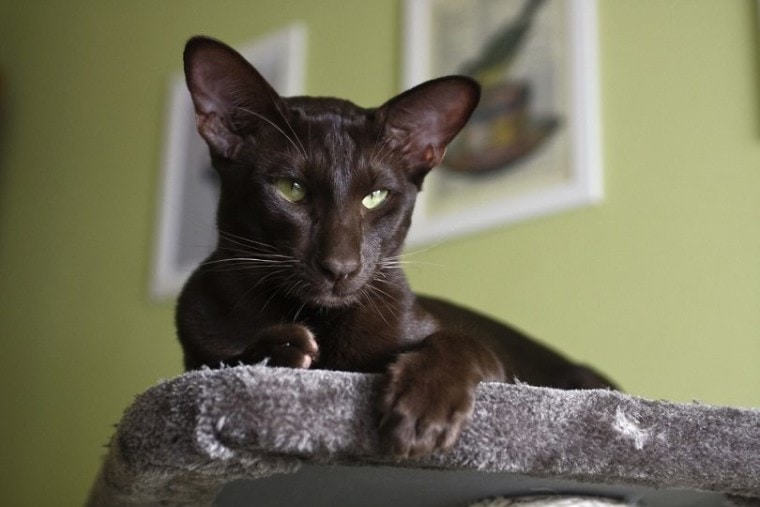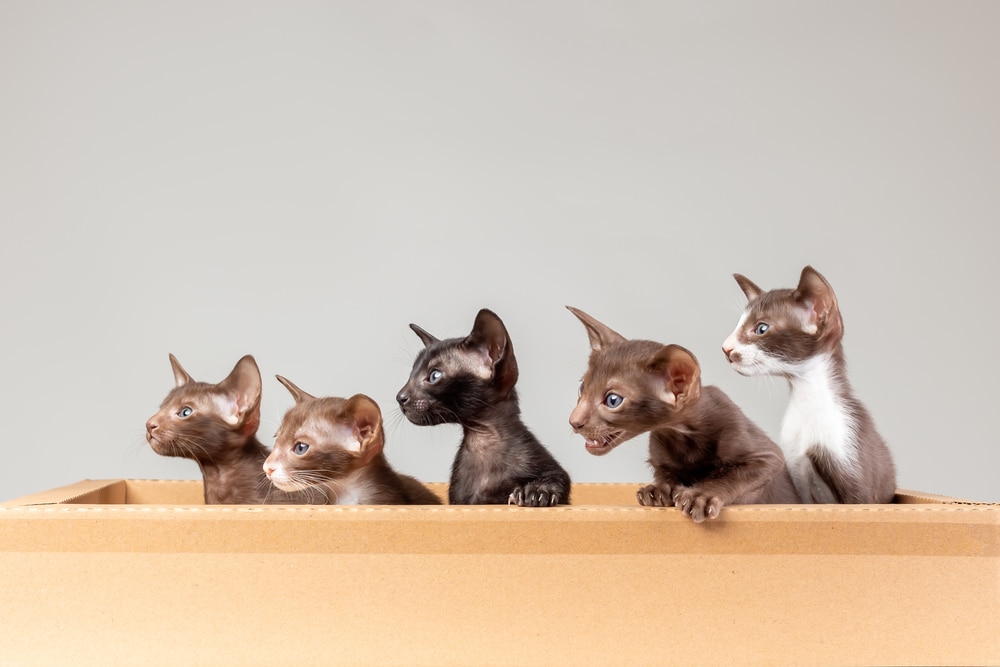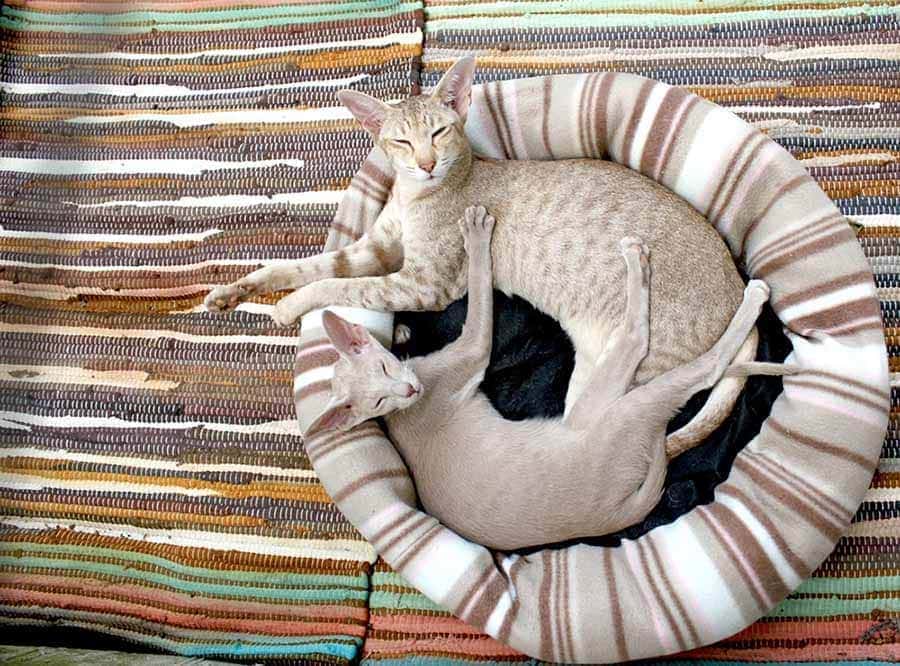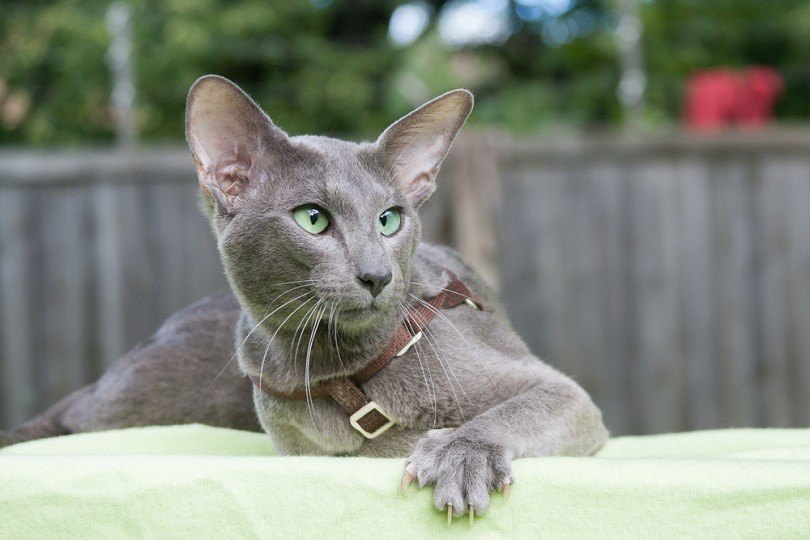
Click Below to Skip Ahead
You have probably seen pictures of these interesting kitties with their very oversized ears and human-like facial expressions. These unusual beauties are highly social cats who thrive on the companionship of both human and furry friends.
Breed Overview
Height:
9 – 11 inches
Weight:
8 – 12 pounds
Lifespan:
8 – 12 years
Colors:
Chocolate, brown, sable, cinnamon lavender, silver, fawn, blue, gray, black, ebony cream, beige, tan, lilac, red, orange, white
Suitable for:
Active families, multi-pet households, homebodies
Temperament:
Vocal, social, attentive, adventurous
If you’re looking for a totally interesting cat breed with lots of personality, you couldn’t have picked a better potential interest. Let’s go over all the details about this long, lean feline to see if they are the perfect match for your new family member.
Oriental Shorthair Cat Characteristics

Oriental Shorthair Kittens

Oriental Shorthairs are common enough that you should be able to find one in your state. While the likelihood is a lot less, you could find one of these cool cats in a rescue or shelter. Things happen—owners move, go to nursing facilities, have babies—you name it. If one of these adults or kittens found their way into a shelter, you can always give them a second chance at life.
Some cats might be very aloof and even nervous about new homes. However, the Oriental Shorthair is so social and exploratory they will be super excited to meet their new family and explore a new space. Much like cats winding up in shelters, some owners might want to rehome their Oriental Shorthair because of unforeseen circumstances.
Oriental Shorthair Cat Temperament & Intelligence
Oriental Shorthair cats will stun you with their intelligence. They are so brilliant, in fact, they are debatably the most intelligent feline breed around. Because of their mental thirst, it might make sense that they always require stimulation, as they get bored easily.
Their mental state makes them a super easy candidate for feline training. This is the type of cat that can learn all sorts of tricks and such since they maintain their attention span, inquisitively learning new concepts with ease.
It isn’t unusual to see these cats walking on a lead or performing for company. However, they also might outsmart you at times, cleverly outwitting human counterparts with their keenness. They are also very talkative, using meows and other sounds to communicate directly with their humans.
Oriental Shorthairs are optimal athletes and love to climb, perch, pounce, and play. It’s in an owner’s best interest to give this cat lots of fun activities like scratching posts, exercise stations, chasing toys, and cat towers to occupy them.
As a notable downfall, these cats do not fare well when left alone. A bored Oriental Shorthair can lead to more complications, like nervousness, destructive tendencies, and depression.

Are Oriental Shorthairs Good for Families? 👪
The Oriental Shorthair can be an ideal addition to many home lives. They are highly friendly and willing to get in on all the family business. They always want to check out goings-on. So that means you’ll have a partner in crime ready to help you get ready for work or any other task at hand.
These cats have the perfect temperament and activity level to make wonderful playmates for kids. They might not work as well with children who haven’t learned how to interact respectfully with animals yet, so we recommend the breed for children roughly five and older.
On the flip side, they also have an incredibly affectionate aspect to their personalities. So, when they are tuckered out, they enjoy being pet whenever. They might stop an attack even during play for a few scratches on the chin.
These cats can make wonderful family additions, but they might not work as well for smaller living spaces or with senior owners. They need lots of space and attention, and some older adults or people with mobility issues might have a little trouble keeping up with their demands.
Do Oriental Shorthairs Get Along with Other Pets?
Many owners might tell you that having an Oriental Shorthair is a lot like having a dog. They’re a little needier than a traditional housecat and can learn or enjoy many activities dogs do.
So, it might not surprise you to learn that not only do Oriental Shorthairs get along with other pets, it’s almost a requirement that you should have another pet in the house. These kitties desire stimulation from all sorts of sources, including having another furry companion to get into mischief with.
However, there are exceptions to this. No cat, including the Oriental Shorthair, should ever be around or left alone with cage animals, including rodents, birds, or reptiles. These cats have a high prey drive, and the frantic movements and triggering scents of these animals can spark their primal desires.


Things to Know When Owning Oriental Shorthair Cats:
Food & Diet Requirements 
While Oriental Shorthair cats don’t have any diet restrictions right off the bat, there are a few things to consider when choosing a diet for the breed.
First, since they are so high energy, these cats require a protein-rich recipe with the essential ingredients to create excellent bodily function.
Oriental Shorthairs are prone to overeating and weight gain. Because of their long, lean frame, they show weight gain easily. They need proper portion control and timed scheduling with food. Any overeating can result in a pot-bellied appearance and even become troublesome eventually.
With your vet’s approval, you should decide which cat food works best for your Oriental Shorthair. Some of this might come down to dietary restrictions, preference, and targeted nutrition.
Commercially speaking, there are wet food, dry kibble, freeze-dried, and some fresh-formed cat foods on the market. But many cat owners are creating their own recipes in the comfort of their own kitchen.
Exercise 🐈
You will not have to convince this breed to play. It seems like they are always cranked up a few notches. You might notice how easy it is to get your Oriental Shorthairs’ attention with any movement at all. It isn’t unusual for this breed to play attack in the dark.
These cats love testing their own agility and body limits, jumping to the highest points of the home, and even climbing up walls if they can. While spaying and neutering tend to mellow the breed a tad, these are real athletes of the cat world.
To avoid destructive behaviors from forming, giving your cat a variety of play options will properly channel their exuberant energy.
Your cat needs roughly 15 minutes of exercise to stay happy and healthy. But this number is very low for the breed, meaning they will take care of exercise on their own for the most part.

Training 🧶
These cats catch on like no other when it comes to the basics. They are so receptive to their environment, they soak up any information they’re given. It isn’t unusual for a kitten of this breed to become litter-trained the second their paws hit the clay.
This is the type of breed you could train to use the toilet and flush it—just like the character Jinx on Meet the Fockers. That is how smart they really are.
You can also easily acclimate them to walking on a lead. Soon, you can take the breed on a walk in town with no consequence—and their adventurous hearts will love getting out to explore.
Because this breed is so highly trainable, we recommend them hand over fist for someone who wants to teach their cat all sorts of tricks.
Grooming ✂️
Grooming should be a cinch for this breed. Hypoallergenic, this cat doesn’t produce as many allergy-inducing proteins as their other feline cousins.
While they take care of most grooming and coat maintenance themselves, they still benefit from regular brushing. This particular breed views brushing as a sign of affection, so they will feel bonded to you the more your brush.
As far as their claws go, we never recommend declawing. However, you can file their nails or buy adorable nail covers to prevent unwarranted scratching.

Health and Conditions 🏥
When you bring home your Oriental Shorthair, vetting from the beginning is essential. Your vet can tell you if your cat is on par with growth and make sure their bodies are functioning properly. They also keep your cats on schedule with vaccinations.
Some conditions are genetic, while others develop gradually. While this breed isn’t prone to a wide list of health issues, specific issues crop up more often.
Male vs Female
Males and females are both highly energetic, peppy, and social spirits. There can be some notable differences in personality—like females might be better hunters and males might be more physically affectionate. But there is no guarantee.
Males tend to be larger than their female counterparts. However, both genders have long, sleek bodies and look visually identical.
Both males and females are capable of spraying, so make sure to spay or neuter your cat before they reach sexual maturity at six months of age.

3 Little-Known Facts About the Oriental Shorthair Cat
1. Oriental Shorthair cats are mixed with American and Siamese cats.
Combining the exciting personality traits and looks of the Siamese and American Shorthair.
2. Oriental Shorthair cats are considered hypoallergenic.
Even though no cat is 100% hypoallergenic, the Oriental Shorthair is considered a cat that doesn’t trigger allergies as much as other breeds.
3. Oriental Shorthair cats require constant stimulation.
Oriental Shorthairs are rather needy cats who thrive on companionship.


Final Thoughts
If you think that the Oriental Shorthair sounds like a prize-winning pick, with a personality that fits your lifestyle—it’s time to start your search. You can check with local breeders, shelters or rescues, or private owners in your area.
Remember, Oriental Shorthairs are unusual-looking, adorable felines with a thirst for knowledge and desire to play, play, play! Highly dependent, these guys don’t like being alone. They also tend to be very chatty, so remember if you have close neighbors or prefer a quieter cat.
See also:
Featured Image Credit: Jolanta Jd, Shutterstock






